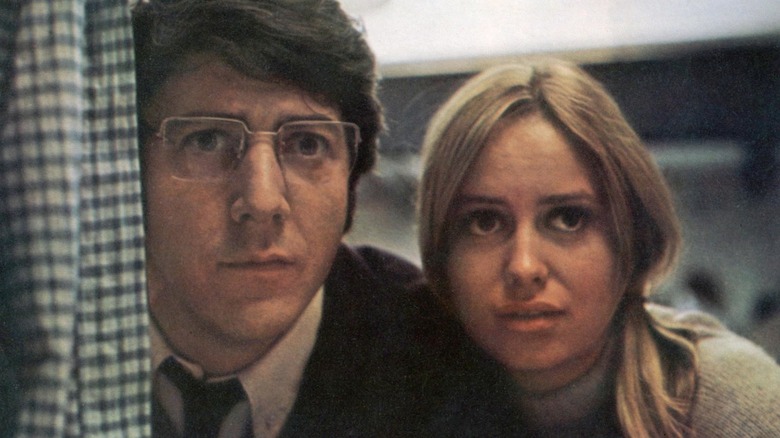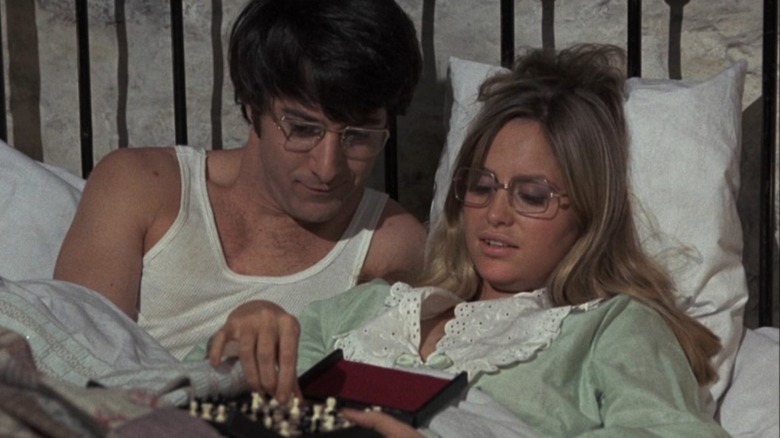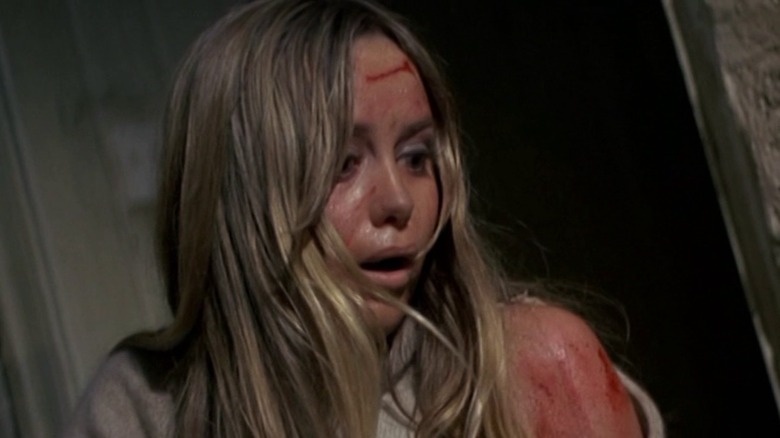The Straw Dogs Controversy Explained: The Trouble With Amy
Trigger Warning: Sexual Assault/Rape
The last film class I took in college was titled "Violence in American Cinema," and the curriculum provided by the remarkable Roberta Di Carmine, Ph.D. included two films by "Bloody" Sam Peckinpah, "The Wild Bunch" and "Straw Dogs." While every class inspired heated discussions — imagine Midwest college kids debating Quentin Tarantino — none were as passionate as the ones that surrounded "Straw Dogs." Released in 1971 (and remade in 2011), "Straw Dogs" follows mild-mannered intellectual David Sumner (Dustin Hoffman) and his English wife Amy (Susan George) as they relocate to Amy's hometown of Cornwall. The move is supposed to help the couple escape their chaotic life in the States so David can work on his research. Unfortunately, the pair's peaceful, rural existence is interrupted as David is repudiated by the local men of the village — in particular, Amy's ex Charlie (Del Henney).
As the harassment escalates, Amy is sexually assaulted by two of the men in town, and their continued intimidation pushes David to the brink of sanity. "I will not allow violence against this house," he declares, and wages a revenge plot against all who have brought harm to him and his wife. Sexual violence in all forms of media is controversial. But few films outside of the intentional depictions of the rape-revenge genre have a legacy as contentious as "Straw Dogs." Even today, after over 50 long, well debated years, there still isn't a consensus on how to interpret "Straw Dogs," and it seems likely that a conclusion will never be found.
Two stories at once
The controversy begins when Charlie and his friends take David out on a hunt, only to leave him out on the moors so they can head back into town and assault Amy. When David finally makes it back home, he's embarrassed and irritated by their abandonment, and has no knowledge of what took place. Amy doesn't tell her husband what happened — a choice that is her right to make. Therefore, David's explosion of rage and vengeance is not in Amy's defense, but of his own accord. From the point of Amy's first assault (yes, there is more than one) onward, David and Amy are operating from two different perspectives. We are witnessing two stories at once, and unfortunately, as David's perspective becomes the dominant force toward the final third of the film, Amy's is left ambiguous.
Another major focal point is a moment during Amy's first assault where it appears as if she's enjoying the violence being enacted upon her. What begins as a horrific act has a moment where she embraces the face of her attacker, and acts in a way that implies that she is encouraging the continued violence. This moment isn't just an interpretation or a subtextual read, but an intentional decision made by Peckinpah that has been analyzed and interpreted for half a century. Is this moment proof that Peckinpah is nothing more than an exploitative misogynist, or is there something else happening that warrants discussion?
Susan George agreed with Peckinpah's vision
Amy is a complicated character, and one that doesn't allow for simple interpretation. As much as she so clearly loves her husband, there are attributes of his character that leave her feeling dissatisfied. When Charlie attacks her, the moment is horrific. She slaps him, she tries to fight him off, and when she is unsuccessful at combating him, there's a deeply upsetting moment of acceptance. Film critic Hal Kitchen brilliantly analyzes the scene in their assessment for 25 Years Later:
The abiding impressions with which the film leaves the viewer are of her trauma and self-loathing, her fear as she watches her ineffectual husband attempt to take control of a situation in ignorance of what she has already undergone, her loathing of that ignorance, and her own desire not to confront what has happened.
When David goes on the warpath, Amy is horrified to see this side of him, knowing full well that David is doing this without the knowledge of what has happened to her. This only exacerbates her guilt and confusion as she struggles to navigate how she feels. Actress Susan George has been very public with her feelings about the making of "Straw Dogs": In an interview with "Gods Of Cinema," she explained that she threatened to leave the project if Peckinpah didn't include her in the framing of Amy's sexual assault on screen. Ultimately, George agreed with Peckinpah about the need to include the difficult and confusing scene, and has said that she is proud of how the film turned out.
No one can speak on behalf of all survivors
What makes the scene in "Straw Dogs" so controversial is that it forces viewers — both survivors of sexual assault and those who have never experienced it — to put themselves in Amy's position. They judge her reactions on how they feel they would have reacted, or how they expect she should respond. Here's the uncomfortable truth: There is no such thing as a universal response to sexual assault. I'm not going to list the multitude of ways that a person can react during an assault. But given the circumstances of Amy's first assault, her moment of dissociative pleasure is not out of the realm of possibility. To assume that Peckinpah or George were trying to imply that rape is "enjoyable" or "not as bad as it seems" is problematic, and encourages a narrative that there is a "correct" way to respond to being sexually assaulted.
Amy, unfortunately, is assaulted again later in the movie, and there is no mistaking her reaction for pleasure. She is horrified in the moment, and George effectively portrays Amy's contradictory feelings, which often change from scene to scene. A woman overcoming rape does not always come with a straightforward revenge plot of her own. Sometimes, it's a lot more complicated, heartbreaking, and difficult to assess. David's version of "Straw Dogs" is a violent thriller with a cathartic conclusion, but Amy's story is a relentless and impossible-to-define trauma response. The only person who can appropriately analyze what happened to Amy, is Amy.


